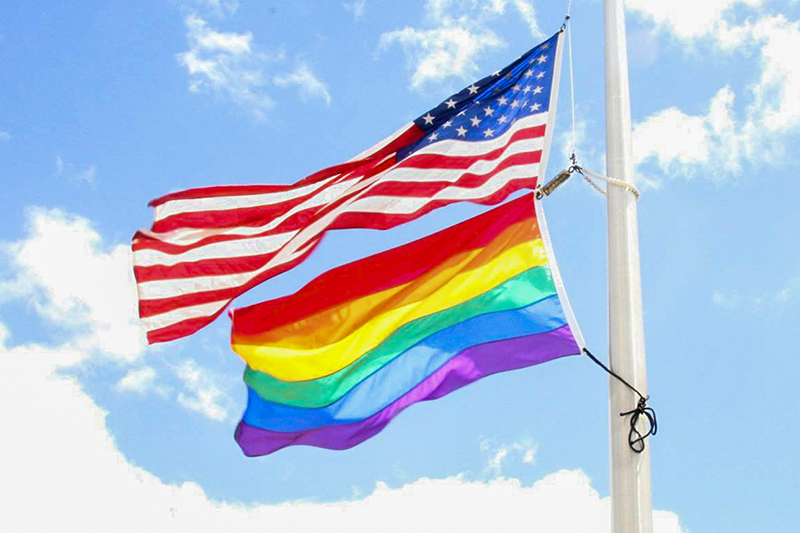1 in 8 LGBTQ People Live Where They Can Be Denied Medical Care
The recent passage of a "medical conscience" law in South Carolina continues the ongoing assault against LGBTQ health care rights.

A new analysis by a nonprofit think tank claims that 1 in 8 LGBTQ Americans currently live in states where medical professionals can legally deny service on the basis of their religious beliefs.
South Carolina recently became the seventh state to permit medical professionals to decline services based on their personal religious or moral beliefs — joining the state of Mississippi, Alabama, Arkansas, Tennessee, Ohio, and Illinois, reports NBC News.
According to the Movement Advancement Project, a think tank that focuses on LGBTQ-related policies, with South Carolina’s addition, one-eighth of all LGBTQ people in America now live in states allowing denial of care, and preventing lawsuits from being lodged against providers who refuse to treat patients.
Such policies are often approved under the auspices of “expanding religious freedom” or protecting First Amendments rights to freedom of speech and freedom of religion. This is especially true for transgender people, who can run afoul of such laws when they seek out gender-affirming care or reproductive health treatments. For example, many of the laws allow nurses or doctors to refuse to perform, take part in, or even prepare a room for a procedure — be it abortion or gender confirmation surgery — to which they have personal objections.
Some laws even go further, with Ohio’s law allowing insurers to refuse to cover treatments that violate the “moral, ethical, or religious beliefs or principles” held by medical providers, hospitals, or even, in the case of employer-provided health insurance, a patient’s employer.
In South Carolina, the bill that ultimately passed the legislature in May was delayed in January after Republicans became concerned that medical providers might refuse to treat patients who refuse to get vaccinated against COVID-19. But those fears were pushed to the side when the bill came up for a vote in June.
State Senator Larry Grooms (R-Bonneau) defended the law, telling NPR that the law’s purpose is to ensure people can stay true to their religious beliefs, saying: “This is America, where you should have the freedom to say no to something you don’t believe in.”
Several other states have previously proposed similar bills. All over the country, LGBTQ people are facing greater and greater restrictions on their political, social, and medical lives, with some state governments even going so far as to target specific procedures, such as gender-affirming care — either by denying insurance coverage through private insurance and Medicaid, or by banning access to certain treatments by minors.
Ivy Hill, the community health program director for the Campaign for Southern Equality, told NBC News that these laws, “of course,” only make the situation worse.
“People who are already on the margins of the margins are going to be the ones who are most deeply impacted by stuff like this,” Hill said.
The Biden administration has recently taken steps to limit the ability of states and medical institutions to institute policies that allow for discrimination. The Department of Health and Human Services (HHS) has proposed a set of rules that would change its interpretation of Section 1557 of the Affordable Care Act. That section of the law explicitly bans discriminatory practices on the basis race, color, national origin, sex, age, and disability in the health care industry.
However, the interpretation of what constitutes discrimination “based on sex” has varied depending on the political leanings of the presidency, with Republican administrations arguing that “sex” only refers to instances when a person is denied services based on their assigned sex at birth.
In 2020, the conservative U.S. Supreme Court embraced the concept, in an employment law case, that discrimination based on sexual orientation and gender identity is a form of sex-based discrimination. However, that decision was narrowly tailored to employment situations, and did not address discrimination in the health care sector or rights of conscience for individual medical workers or religiously-affiliated hospitals. However, Democratic administrations have favored the overall idea that any form of anti-LGBTQ discrimination is inherently a form of sex-based discrimination.
The proposed rule from HHS would largely reverse changes instituted by the Trump administration that allowed medical institutions to deny coverage to LGBTQ people. This rule specifically notes that medical institutions can’t discriminate based on someone’s gender identity.
Although this new rule from HHS would protect LGBTQ people from denials of care, it still has to go through the regular rule-making process, including a public comment period, and may undergo changes before being implemented. More than that, disgruntled states or medical institutions can always challenge new regulations in the legal system and receive rulings that allow room for discrimination. However, some courts have also ruled in favor of LGBTQ patients challenging hospitals for refusing to perform certain procedures.
Support Metro Weekly’s Journalism
These are challenging times for news organizations. And yet it’s crucial we stay active and provide vital resources and information to both our local readers and the world. So won’t you please take a moment and consider supporting Metro Weekly with a membership? For as little as $5 a month, you can help ensure Metro Weekly magazine and MetroWeekly.com remain free, viable resources as we provide the best, most diverse, culturally-resonant LGBTQ coverage in both the D.C. region and around the world. Memberships come with exclusive perks and discounts, your own personal digital delivery of each week’s magazine (and an archive), access to our Member's Lounge when it launches this fall, and exclusive members-only items like Metro Weekly Membership Mugs and Tote Bags! Check out all our membership levels here and please join us today!
























